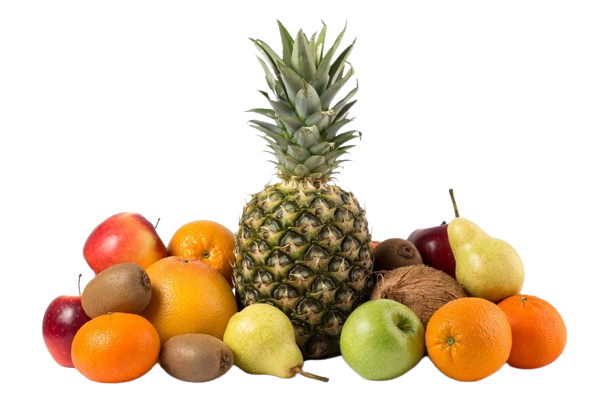Table of Contents
ToggleBenefits of Fruits
Fruits, nature’s vibrant and delicious creations, are not only a delight to the taste buds but also a treasure trove of health benefits. As we explore the bountiful world of fruits, their myriad colours, flavours, and textures offer more than just culinary pleasure.
The focus of this exploration is on the myriad benefits of fruits, highlighting how their inclusion in our daily diet can contribute to overall well-being and vitality. From essential vitamins and minerals to disease prevention and weight management, fruits stand as nutritional powerhouses that play a crucial role in fostering a healthier and more vibrant life.
Let’s delve into the rich tapestry of benefits that fruits bring to the table, elevating not only our meals but also our health.
Nutritional Benefits
A. Rich in vitamins
Vitamin C for Immune System Support
Fruits emerge as natural champions in delivering a potent dose of Vitamin C, a crucial nutrient known for its immune-boosting properties. This essential vitamin stimulates the production of white blood cells, bolstering the body’s defense mechanisms against infections and illnesses.
Regular consumption of fruits like oranges, strawberries, and kiwi not only tantalizes the taste buds but also fortifies the immune system, contributing to a robust and resilient overall health.
Vitamin A for Eye Health:
Within the vibrant spectrum of fruits lies a wealth of Vitamin A, a nutrient pivotal for maintaining optimal eye health. Fruits such as mangoes, apricots, and cantaloupes are rich sources of beta-carotene, a precursor to Vitamin A.
This vitamin plays a pivotal role in preserving vision, supporting low-light and color vision, and safeguarding the eyes against age-related conditions. By incorporating these Vitamin A-rich fruits into our diet, we nourish our eyes and contribute to long-term visual well-being.
B. High in minerals
Potassium for Heart Health
Fruits stand out as excellent sources of potassium, a mineral that plays a vital role in promoting heart health. Potassium helps regulate blood pressure by counteracting the effects of sodium, supporting proper heart function, and reducing the risk of cardiovascular diseases.
Bananas, oranges, and cantaloupes are potassium-rich fruits that, when included in the diet, contribute to the maintenance of a healthy blood pressure, ensuring the heart functions optimally and reducing the likelihood of hypertension-related complications.
Magnesium for Bone Health
The mineral magnesium, crucial for bone health, is abundantly present in various fruits. Magnesium aids in the absorption and metabolism of calcium, contributing to the development and maintenance of strong and healthy bones.
Fruits such as avocados, figs, and bananas provide a magnesium boost to the diet, supporting bone density and potentially reducing the risk of osteoporosis.
By incorporating magnesium-rich fruits into our daily meals, we not only savor their natural sweetness but also fortify the foundation of our skeletal system, ensuring long-term bone health.
Dietary Fiber
A. Aid in Digestion
Fruits serve as exceptional sources of dietary fiber, a crucial component that aids in the digestive process. Fiber adds bulk to the diet, promoting regular bowel movements and preventing constipation.
The soluble fiber found in fruits like apples, pears, and berries forms a gel-like substance in the digestive tract, helping to soften stool and facilitate its smooth passage.
By including fiber-rich fruits in our diet, we support a healthy digestive system, ensuring efficient nutrient absorption and waste elimination.
B. Regulation of Blood Sugar Levels
The fiber content in fruits plays a pivotal role in regulating blood sugar levels. Soluble fiber slows down the absorption of sugar, preventing rapid spikes in blood glucose after meals.
This is particularly beneficial for individuals with diabetes or those aiming to manage their blood sugar levels. Fruits such as grapefruits, cherries, and oranges provide a natural source of fiber, offering a sweet and nutritious option that contributes to the overall stability of blood sugar levels.
C. Promotion of a Feeling of Fullness, Aiding in Weight Management
The inclusion of fruits in a balanced diet contributes to a lasting feeling of fullness, making them valuable allies in weight management. The fiber in fruits adds volume to meals without adding excessive calories, promoting satiety and reducing overall food intake.
By reaching for fiber-rich fruits like apples, pears, and berries, individuals can satisfy their cravings in a healthy manner, making it easier to maintain a calorie-conscious diet and achieve or maintain a healthy weight.

benefits of fruits
Antioxidant Properties
A. Protection Against Oxidative Stress
Fruits are rich in antioxidants, which play a vital role in protecting the body against oxidative stress. Oxidative stress occurs when there is an imbalance between free radicals and antioxidants in the body, leading to potential damage to cells and tissues.
Antioxidants in fruits, such as vitamin C, vitamin E, and flavonoids, neutralize free radicals, preventing cellular damage. Regular consumption of antioxidant-rich fruits like berries, grapes, and citrus fruits contributes to overall cellular health, providing a defense mechanism against oxidative stress.
B. Reduction of Inflammation
The anti-inflammatory properties of antioxidants found in fruits contribute to the reduction of inflammation in the body. Chronic inflammation is associated with various health conditions, including heart disease, diabetes, and arthritis.
Fruits containing compounds like quercetin, found in apples and berries, and bromelain, found in pineapple, exhibit anti-inflammatory effects. By incorporating these fruits into the diet, individuals may mitigate inflammation, promoting overall health and reducing the risk of inflammatory-related diseases.
C. Potential Cancer Prevention
Antioxidants present in fruits also show promise in potential cancer prevention. Certain antioxidants, such as polyphenols and carotenoids, have been linked to anti-cancer properties. These compounds help neutralize free radicals, which can contribute to the development of cancer by damaging DNA.
Consuming fruits with high antioxidant content, such as blueberries, tomatoes, and pomegranates, may contribute to a lower risk of certain types of cancers. While no single food can guarantee cancer prevention, a diet rich in antioxidant-packed fruits is a valuable component of a holistic approach to health.
Heart Health
A. Lowering Blood Pressure
The soluble fiber found in many fruits contributes to the reduction of cholesterol levels, particularly low-density lipoprotein (LDL) cholesterol, often referred to as “bad” cholesterol. Soluble fiber binds to cholesterol molecules, aiding in their elimination from the body.
Fruits like apples, pears, and citrus fruits are not only delicious but also effective in promoting heart health by helping to manage cholesterol levels. Regular consumption of these fruits can be a natural and flavorful strategy to support cardiovascular well-being.
C. Improving Overall Cardiovascular Health
Fruits offer a holistic approach to improving overall cardiovascular health by providing a combination of essential nutrients, antioxidants, and dietary fiber. The diverse array of vitamins, minerals, and phytochemicals in fruits collectively contribute to the strengthening of the heart and circulatory system.
Antioxidants help protect blood vessels, while fiber aids in maintaining healthy cholesterol levels. By embracing a diet rich in fruits, individuals can foster a heart-healthy lifestyle, reducing the risk of heart disease and enhancing the overall well-being of the cardiovascular system.
Disease Prevention
A. Type 2 Diabetes Prevention
Fruits play a pivotal role in the prevention of Type 2 diabetes, a metabolic disorder characterized by insulin resistance. The fiber content in fruits helps regulate blood sugar levels by slowing down the absorption of glucose.
Additionally, certain fruits, such as berries, cherries, and apples, contain antioxidants and compounds that may enhance insulin sensitivity. Incorporating a variety of fruits into the diet not only satisfies sweet cravings naturally but also contributes to a balanced and diabetes-friendly eating pattern, reducing the risk of developing Type 2 diabetes.
B. Reduction of the Risk of Certain Cancers
The rich array of antioxidants, vitamins, and phytochemicals found in fruits is associated with a reduced risk of certain cancers. These compounds work synergistically to neutralize free radicals, inhibit the growth of cancer cells, and protect DNA from damage.
Fruits such as berries, citrus fruits, and cruciferous vegetables have been linked to cancer prevention due to their unique combinations of bioactive compounds. While no single food can guarantee cancer prevention, the regular consumption of a diverse range of fruits is a valuable component of a cancer-conscious lifestyle.
C. Support for Overall Immune Function
Fruits contribute to robust immune function through their abundance of vitamins, particularly vitamin C, and other immune-boosting nutrients. Vitamin C enhances the production and function of white blood cells, which are crucial components of the immune system.
Fruits such as oranges, strawberries, and kiwi are excellent sources of vitamin C. Including a variety of fruits in the diet provides a spectrum of immune-supportive nutrients, contributing to the body’s ability to fend off infections and illnesses, and promoting overall immune resilience.
Hydration
A. High Water Content in Fruits
Fruits are nature’s hydrating jewels, with many varieties boasting a high water content. Water is essential for various bodily functions, including digestion, nutrient transport, and temperature regulation.
Fruits such as watermelon, strawberries, and cucumbers have water content exceeding 90%, making them delicious and refreshing ways to stay hydrated. The synergy of water and natural sugars in fruits not only quenches thirst but also provides a source of energy, making them an ideal choice for maintaining hydration levels throughout the day.
B. Contribution to Overall Daily Fluid Intake:
In addition to their inherent water content, fruits contribute significantly to the overall daily fluid intake. Consuming a variety of fruits complements other beverages, such as water and herbal teas, in meeting the body’s hydration needs. The combination of water and electrolytes in fruits aids in maintaining fluid balance, preventing dehydration.
This is especially important in warmer climates or during physical activity when the body loses water through sweat. By incorporating hydrating fruits into the daily diet, individuals enhance their overall fluid intake, supporting optimal bodily functions and promoting a state of well-hydrated vitality.
Weight Management
A. Low Calorie and Fat Content
Fruits emerge as natural allies in weight management due to their low calorie and fat content. These nutrient-dense foods provide a satisfying sweetness without contributing excessive calories or unhealthy fats.
Incorporating fruits like berries, melons, and citrus fruits into the diet allows individuals to indulge their sweet cravings while maintaining a calorie-conscious approach, making them valuable components of a balanced and weight-conscious eating plan.
B. High Nutritional Density
Despite their lower calorie content, fruits are nutritionally dense, packed with essential vitamins, minerals, and antioxidants. This high nutritional density ensures that individuals receive a spectrum of vital nutrients, supporting overall health even as they manage their weight.
Nutrient-rich fruits such as bananas, apples, and mangoes offer a wealth of health benefits, making them not only a flavorful addition to the diet but also a strategic choice for those seeking to nourish their bodies while moderating calorie intake.
C. Satiety-Promoting Qualities
The fiber content in fruits contributes to a feeling of fullness, promoting satiety and aiding in weight management. Fiber slows down digestion, stabilizing blood sugar levels and extending the duration of feeling satisfied after consuming a meal or snack.
Fruits like apples, pears, and berries, with their rich fiber content, can be instrumental in curbing excessive hunger and preventing overeating. By incorporating satiety-promoting fruits into meals and snacks, individuals can navigate their weight management journey more effectively, balancing the pleasure of eating with mindful nutritional choices.
Skin Health
A. Collagen Production Support
Fruits play a crucial role in supporting skin health by contributing to collagen production. Collagen is a structural protein that provides elasticity and firmness to the skin. Vitamin C, found abundantly in fruits such as oranges, strawberries, and kiwi, is essential for collagen synthesis.
consumption of these fruits promotes collagen production, aiding in the maintenance of skin suppleness and resilience. As a natural boost to the body’s collagen-building processes, fruits contribute to a vibrant and youthful complexion.
B. Prevention of Premature Aging
The antioxidants present in fruits act as powerful defenders against free radicals, which can accelerate the aging process and lead to premature wrinkles and fine lines.
Fruits like blueberries, pomegranates, and grapes are rich in antioxidants, helping to neutralize oxidative stress and protect the skin from environmental damage.
By incorporating antioxidant-rich fruits into the diet, individuals can actively contribute to the prevention of premature aging, maintaining a youthful and radiant skin appearance.
C. Treatment for Certain Skin Conditions
Some fruits exhibit properties that can aid in the treatment of certain skin conditions. For instance, the enzymes in papaya and pineapple, such as papain and bromelain, respectively, have natural exfoliating properties that can help remove dead skin cells and promote a smoother complexion.
Additionally, fruits with anti-inflammatory compounds, like avocado and cucumber, may offer relief for conditions such as acne or redness. While not a substitute for professional skincare, the inclusion of these fruits in a well-balanced diet can complement a holistic approach to skin health.
Versatility in Culinary Use
A. Snacking Options
Fruits showcase their versatility as convenient and nutritious snacking options. Whether enjoyed whole or sliced, fruits like apples, bananas, and grapes provide a naturally sweet and satisfying snack.
Their portability makes them ideal for on-the-go consumption, offering a quick energy boost along with a plethora of vitamins and minerals. Diverse snacking possibilities with fruits contribute not only to physical well-being but also to the joy of savoring delicious and wholesome treats.
B. Inclusion in Meals and Desserts
Fruits effortlessly elevate both savoury meals and indulgent desserts, adding bursts of flavour, colour, and nutritional value. In salads, fruits like strawberries, mangoes, or citrus segments bring a refreshing contrast. In main courses, fruits can be incorporated into sauces or chutneys, enhancing the overall taste profile.
When it comes to desserts, fruits shine in pies, tarts, and as natural sweeteners in various baked goods. Their versatility allows for creative culinary exploration, ensuring that fruits play a central role in the diversity of flavours experienced during meals and desserts.
C. Diversity of Flavors and Textures:
Fruits contribute a rich tapestry of flavours and textures to culinary creations. From the sweetness of ripe peaches to the tartness of berries, and the crispness of apples to the creamy texture of avocados, fruits offer a spectrum of taste experiences.
This diversity allows chefs and home cooks to experiment with contrasting flavours and textures in salads, smoothies, sauces, and more. The adaptability of fruits to both sweet and savoury dishes ensures that they remain a dynamic and essential component of a well-rounded and flavorful culinary repertoire.
Conclusion
A. Recap of Key Benefits: As we conclude our exploration of the myriad benefits of fruits, it becomes evident that these vibrant gifts of nature offer more than just delightful flavours.
From being rich sources of essential vitamins and minerals to promoting heart health, aiding in digestion, and supporting immune function, fruits emerge as nutritional powerhouses.
Their antioxidant properties contribute to disease prevention, while their hydrating nature and low-calorie profile make them valuable allies in weight management.
Fruits also play a significant role in enhancing skin health and exhibit unmatched versatility in culinary use. The multifaceted advantages of including fruits in our diet underscore their indispensable role in fostering overall well-being.
B. Encouragement for Incorporating a Variety of Fruits into the Daily Diet: As we navigate the journey towards a healthier lifestyle, let the vibrant colours and natural sweetness of fruits inspire us.
The key to unlocking their full potential lies in diversity—incorporating a wide variety of fruits into our daily diet. From the familiar favourites to exotic choices, each fruit brings its own unique set of nutrients and health benefits.
Let’s embrace the joy of culinary exploration by incorporating fruits into snacks, meals, and desserts. The beauty of fruits lies not only in their taste but also in their ability to contribute to a balanced and nutritious diet.
So, let us savour the goodness of fruits, relishing their flavours while reaping the countless benefits they offer for our well-being.



